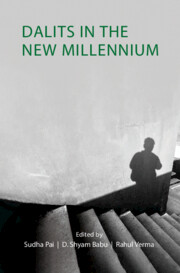Book contents
- Frontmatter
- Contents
- List of Figures
- List of Tables
- Acknowledgements
- 1 Introduction: Dalit Discourse in the New Millennium
- Part I Shifting Patterns of Electoral Politics
- Part II Popular Culture, Discourse, and Protest
- Part III Transformations in Ideology and Identity
- Part IV Aspirations and Anxieties
- Part V Discrimination and Representation
- 20 Do Scheduled Caste Reservations for Political Office Improve the Lives of Dalits?
- 21 Are Dalit Legislators Performing Their Oversight Role? Evidence from the Question Hour in the Lok Sabha and Select State Legislatures
- 22 Why Are Some Backward Castes Demanding Scheduled Caste Reservation?
- 23 Measuring Caste-Based Discrimination
- 24 Dalit Suicides in India
- About the Contributors
- Index
20 - Do Scheduled Caste Reservations for Political Office Improve the Lives of Dalits?
from Part V - Discrimination and Representation
Published online by Cambridge University Press: 12 July 2023
- Frontmatter
- Contents
- List of Figures
- List of Tables
- Acknowledgements
- 1 Introduction: Dalit Discourse in the New Millennium
- Part I Shifting Patterns of Electoral Politics
- Part II Popular Culture, Discourse, and Protest
- Part III Transformations in Ideology and Identity
- Part IV Aspirations and Anxieties
- Part V Discrimination and Representation
- 20 Do Scheduled Caste Reservations for Political Office Improve the Lives of Dalits?
- 21 Are Dalit Legislators Performing Their Oversight Role? Evidence from the Question Hour in the Lok Sabha and Select State Legislatures
- 22 Why Are Some Backward Castes Demanding Scheduled Caste Reservation?
- 23 Measuring Caste-Based Discrimination
- 24 Dalit Suicides in India
- About the Contributors
- Index
Summary
Over the past 20 years, much empirical work has examined the impact – on a variety of outcomes – of political reservations for members of the Scheduled Castes (SCs) in India. In this chapter, we provide an overview of what we know about the effects of reservations in the Indian parliament, state legislatures, and local-level elected bodies, to date.
Before we set out, we want to clarify what this chapter is not about. Reservation policies can be normatively justified or opposed. However, positioning ourselves in this debate is not our aim here. Nor are we able to say much about what the effects would have been if the system had been designed differently, if it were to be removed, or if it had been implemented elsewhere. Our goal is rather to lay out what empirical research and data tell us about the current system as implemented in India. We focus here on the individuals we know best: politicians elected in seats reserved for the SCs across India. These are often unknown political actors. Yet they constitute a sizable share of all elected officials in the country: as of September 2022, 84 of 543 members of parliament (MPs), 625 of 4,099 members of legislative assemblies (MLAs), and 15 to 17 per cent of all those elected to over 2,83,000 local elected bodies in villages, blocks, and districts were representatives from seats reserved for the SCs.
While India's political reservation system is unique in its massive scope and duration, many types of electoral quota systems are in place across the world. The extensive normative literature on descriptive representation highlights the importance of including individuals from disadvantaged or marginalized groups in office. Yet the effects of such inclusion are not clear. One common argument is that political representatives are better at representing people like them because of shared experiences or shared interests (Mansbridge, 1999; Duflo, 2005). Empirical research focusing on the United States finds evidence for such patterns: the inclusion of minority groups in politics has been found to boost political participation, increase trust in political institutions, and enhance pride and self-respect (Marschall and Ruhil, 2007; Gay, 2002; Broockman, 2013).
- Type
- Chapter
- Information
- Dalits in the New Millennium , pp. 357 - 373Publisher: Cambridge University PressPrint publication year: 2023



